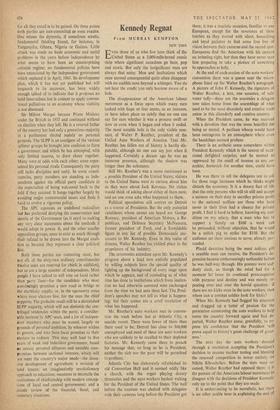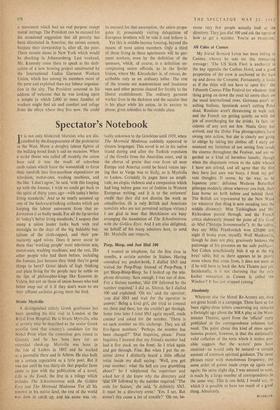Kennedy Regnat
From MURRAY ICEMPTON
NEW YORK
EvEN those of us who live here think of the United States as a 3,000-mile-broad comic strip where significant occasions go bam, pop and zowie. But only the insignificant ones are always that noisy. Men and institutions which once seemed consequential quite often disappear with no audible note beyond a whimper. You do not hear the crash; you only become aware of a hole.
The disappearance of the American labour movement as a force upon which many men looked with hope or fear seems, as an instance, to have taken place so subtly that no one can say for sure whether it was a process swift or slow or even when it began and when it ended. The most notable hole is the only visible rem- nant of Walter P. Reuther, president of the United Auto Workers of America. That Mr. Reuther has fallen out of history is hardly dis- putable, although no one can say just when it happened. Certainly a decade ago he was an immense presence, although the shadow was longer than the substance.
Still Mr. Reuther's was a name mentioned as a possible President of the United States; visitors to the United States were as curious about him as they were about Jack Kerouac. No visitor would think of asking about either of them now; and no one even asks what happened to them.
Political speculation still centres on Detroit as a source of Presidents. But the only potential candidates whose names are heard are George Romney, president of American Motors, a Re- publican, and Defence Secretary McNamara, former president of Ford, and a formidable' figure in any list of possible Democratic suc- cessors to Mr. Kennedy. Even in this realm of dreams, Walter Reuther has yielded place to the proprietors of his industry.
The ceremonies attendant upon Mr. Kennedy's progress about a land now entirely populated by willing subjects have the special quality of lighting up the background of every stage upon which he appears, and of reminding us of what time has done to institutions which from inatten- tion we had otherwise assumed were unchanged from the time we had seen them last. The Presi- dent's speeches may not tell us what is happen- ing; but their scenes are a cruel revelation of what has happened.
Mr. Reuther's auto workers met in conven- tion the week before last at Atlantic .City, a seaside resort. There were fewer of them than there used to be; Detroit has close to 300,000 unemployed and most of these are auto workers who are unlikely to be recalled to their depleted factories. Mr. Kennedy came there to preach his message that, so long as he is President, neither the rich nor the poor will be permitted to profiteer.
Atlantic City has elaborately refurbished its old Convention Hall and it seemed oddly like a church, with the organ playing dreary threnodies and the auto workers hushed waiting for the President of the United States. The well before the rostrum was choked with delegates with their cameras long before the President got there; it was a touristic occasion, familiar to any European, except for the reverence of these tourists as they moved with silent, beseeching and loyal patience to find some free line of vision between their cameras and the sacred spot. Europeans find the American with his camera an irritating sight, but then they have never seen him preparing to take a picture of something he approaches as holy.
At the end of each session of the auto workers' convention there was a queue near the micro- phone lined up for Walter Reuther's autograph. A picture of John F. Kennedy, the signature of Walter Reuther, a box, one assumes, of salt- water taffy—these are the souvenirs a delegate now takes home from the assemblage of what used to be the most disorderly and creative trade union in this disorderly and creative country.
When the President came, he was received with a devotion that was the more heartfelt for being so muted. A partisan whoop would have been outrageous in an atmosphere where even the handclaps seemed profane.
There is an msthetic sense somewhere within President Kennedy which is the source of occa- sional delighted surprise; and he seemed as oppressed by the smell of incense as any an- archist, homesick for another time, could have been.
He was there to tell the delegates not to ask for those wage increases which he thinks might disturb the economy. It is a dreary fact of life that the only persons who will sit still and accept a sermon on their duty to sacrifice private profit to the national welfare are those who have never in their lives had a chance for private profit. I find it hard to believe, knowing my con- dition on my salary, that a man who has to support a family on $100 a week can be persuaded, without objection, that he would be a selfish pig to strike for $110. But the audience sat there anxious to serve, already per- suaded.
Placid devotion being the most tedious gilt a sensible man can receive, the President's de- pression became embarrassingly noticeable before he was half-way through. His posture went sud- denly slack, as though the mind had for a moment let loose its continual preoccupation with purpose and destiny and was merely re- peating over and over the horrid question : if there are no kicks even in the auto workers, then where can a combat soldier look for kicks?
When Mr. Kennedy had flogged his attention and dragged up a tatter of passion for the peroration summoning the auto workers to help move the country forward again and had de- parted, Walter Reuther arose, gratefully, to ex- press his confidence that the President 'will prove equal to history's great challenge of great- ness.'
The next day the auto workers shouted through a resolution accepting the President's decision to resume nuclear testing and blaming the renewed competition in terror entirely on Nikita Khrushchev. Before the tests were re- sumed, Walter Reuther had opposed them; it is the posture of the American labour movement to disagree with the decisions of President KennedY only up to the point that they are made.
It is embarrassing to be moralistic, but there is no other usable tone in explaining the end of a movement which had no real purpose except moral outrage. The President can be excused for his occasional suggestion that all poverty has been eliminated in America; the unions cannot, because their stewardship is, after all, the poor. There remain slums in New York which would be shocking in Johannesburg. Last weekend, Mr. Kennedy came there to speak at the dedi- cation of a new housing project constructed by the International Ladies Garment Workers Union, which has among its members more of the poor and exploited than any labour organisa- tion in the city. The President assumed in his address of welcome that he was looking upon a temple in which 2,000 or more families of workers might find air and comfort and refuge from the alleys where they live now. He could be excused for that assumption; the union propa- gates it; presumably visiting delegations of European brothers will be told it and believe it.
Yet this is middle-income housing, beyond the means of most union members. Only a third of those living in these apartments will be gar- ment workers, even by the definition of the sponsors, which, of course, is a definition en- compassing union officials, as in the Soviet Union, where Mr. Khrushchev is, of course, de- scribable only as an ordinary toiler. The rest of the tenants are academicians and insurance men and other persons cleared for loyalty to the liberal establishment. The ordinary garment worker lives in the darkness and the squalor that is his place while his union, in its anxiety to please, gives subsidies to the middle class.







































 Previous page
Previous page